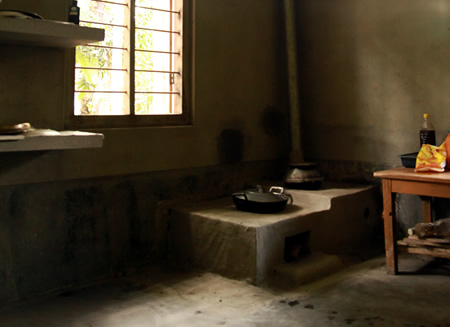Small initiative, big saving: Improved cooking stoves to save a thousand trees in Greater Manas
Greater Manas, May 23, 2013: To help reduce tree-felling in Greater Manas, the International Fund for Animal Welfare – Wildlife Trust of India (IFAW-WTI) is helping install improved cooking stoves in local households in the region. With these stoves installed in 182 households so far, at least 1000 trees may be saved annually, as fuel consumption is reduced by about one kg per person per day.
The community-based conservation activity is a part of the initiative to ‘Bring back Manas’ to its former glory, under the Greater Manas Conservation Project.
The improved cooking stoves have been installed in three clusters of villages around Manas National Park and Reserve Forest. Fabricated using local raw material – soil, cow dung, rice husk and iron bars, these stoves are designed to maximise fuel efficiency.

A survey revealed that the per capita fuel wood consumption in a traditional cook stove (above) was 2.73 kg per day, and the improved stoves reduced this by around 30%. Photos: Sheren Shrestha/IFAW-WTI
“Our prime concern in providing these improved cook stoves was to ensure that fewer trees are fell and less wood is extracted from the forests. When we calculated the fuelwood use before and after installation, we found a reduction of 0.92 kg of wood per day per individual,” said IFAW-WTI sociologist Sanatan Deka.
The stoves have additional benefits as the smoke produced is very less, making it a healthier alternative for these families.
Deepen Goyari, former secretary of the Kahitama Manas Conservation and Ecotourism Development Society, said, “I have not really measured the wood consumption, but I know it benefits my family’s health. The earlier stoves used to give out a lot of smoke, but with these improved stoves, there’s no smoke at all, indoors.”
The improved stoves maximise efficiency by reducing heat wastage. One end has an opening for fuel wood while the other end has the chimney that leads the smoke outside the house. With two stove-openings, two dish can be cooked simultaneously.
“During summers it gets rather hot in this region. As compared to the earlier stoves, these stoves prove a better option for cooking as it does not get very hot around it,” added Goyari, who is himself now advocating for and helping fabricate these improved cookstoves.

The improved stoves maximise efficiency by reducing heat wastage. One end has an opening for fuel wood while the other end has the chimney that leads the smoke outside the house. Photos: Sheren Shrestha/IFAW-WTI
“These cook stoves will directly benefit both the forest’s fringe villages and the wildlife habitats. The good thing is that the people understand its values and have enthusiastically welcomed the change,” commented Samar Boro, another IFAW-WTI sociologist who along with Deka was instrumental in helping implement this initiative.
A pre-installation survey carried out among these families revealed that the per capita fuel wood consumption in a traditional cook stove was 2.73 kg a day. After the improved cook stoves were installed, the per capita fuel wood consumption was found to have fallen to 1.81 kg per day, a reduction of about 30%.
“If we assume that each of the 182 households have at least four members, the annual fuel wood saved amounts to about 2,50,000 kgs of wood, which is equivalent to 1000 trees (of about 250 kg each), as people prefer to cut down small/medium sized trees for fuel wood for ease of felling and transport,” added Deka. “This calculation also only accounts for wood used in cooking their meals. If we include the fuel consumed in brewing local rice beer or feed for their animals, the amount of wood saved will be even higher. Considering its benefits, we are planning to spread this to more households and even forest camps.”
Note: The weight of trees vary with species and season among other characteristics. The calculation on the number of trees saved by this initiative as mentioned here is not based on a rigorous peer reviewed study. The numbers of trees saved could in reality be higher or lower depending on various parameters.









